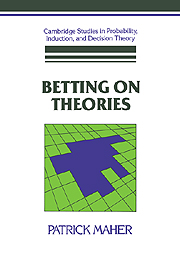Book contents
8 - Representation theorem
Published online by Cambridge University Press: 22 September 2009
Summary
In Chapters 6 and 7, I assumed that rational scientists have utilities for cognitive consequences, as well as probabilities for scientific hypotheses. It is now time to defend that assumption. According to the preference interpretation of probability and utility given in Section 1.3, the assumption would be true if rational scientists have preferences that maximize expected cognitive utility, relative to some probability and cognitive utility functions. My argument will therefore consist in showing that the cognitive preferences of rational scientists can be so represented. This will be done by stating a suitable representation theorem.
It turns out that existing representation theorems are not quite suitable for this purpose. I will show why Savage's representation theorem is not suitable and then state a new representation theorem that does what is wanted. This representation theorem comes in two parts, the first (Section 8.2) establishing a representation for simple cognitive acts, and the second (Section 8.3) extending this to cognitive acts in general. I will describe the assumptions of the theorem in some detail, but proofs are relegated to appendixes.
Even without proofs, this chapter is technical. Readers willing to grant the possibility of a representation (even if only for the sake of argument) could skip this chapter and proceed directly to the discussion of scientific values in Chapter 9.
In Chapter 1, I mentioned Savage's (1954) representation theorem and discussed some of its postulates.
- Type
- Chapter
- Information
- Betting on Theories , pp. 182 - 207Publisher: Cambridge University PressPrint publication year: 1993

